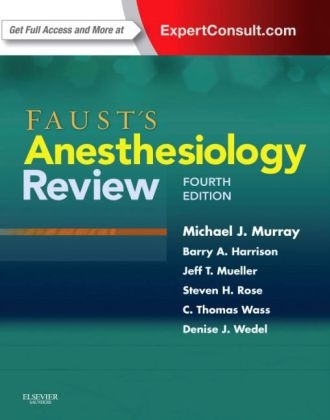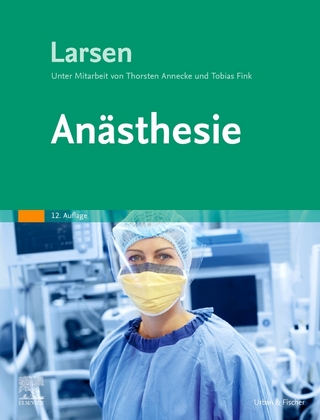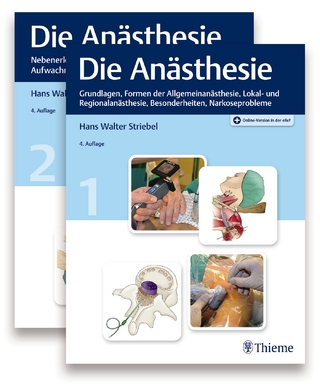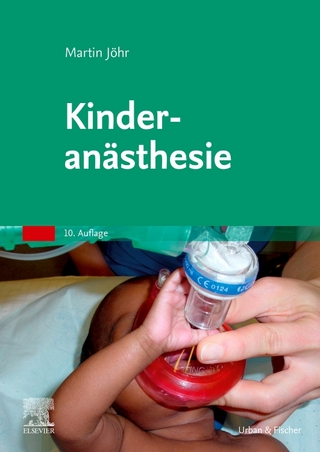
Faust's Anesthesiology Review
Saunders (Verlag)
978-1-4377-1369-5 (ISBN)
- Titel erscheint in neuer Auflage
- Artikel merken
Quickly expand your knowledge base and master your residency with Faust's Anesthesiology Review, the world's best-selling review book in anesthesiology. Combining comprehensive coverage with an easy-to-use format, this newly updated medical reference book is designed to efficiently equip you with the latest advances, procedures, guidelines, and protocols. It's the perfect refresher on every major aspect of anesthesia.
Take advantage of concise coverage of a broad variety of timely topics in anesthesia.
Focus your study time on the most important topics, including anesthetic management for cardiopulmonary bypass, off-pump coronary bypass, and automatic internal cardiac defibrillator procedures; arrhythmias; anesthesia for magnetic resonance imaging; occupational transmission of blood-borne pathogens; preoperative evaluation of the patient with cardiac disease; and much more.
Search the entire contents online at Expert Consult.com.
The perfect resource, which offers concise content for everything needed for certification, recertification, or as a refresher training for anesthesiology, has now improved with a more comprehensive view on the most important topics in the specialty with over 60 new chapters.
I. Operating Room
1
Medical Gas Supply
2
Electrical Supply
3
Microshock Hazards
4
Operating Room Fires
5
Operating Room Management
II. Equipment
6
Vaporizers
7
Flowmeters and the Physics of Gas Flow
8
Carbon-Dioxide Absorption
9
Carbon-Dioxide Retention and Capnography
10
Tracheal Tubes
11
Complications of Tracheal Intubation
12
Disconnect Monitors
13
Closed-Circuit Anesthesia
III. Monitoring
14
Pulse Oximetry
15
Pulmonary Artery Catheters
16
Direct Arterial Blood Pressure Monitoring
17
Noninvasive Blood Pressure Monitoring
18
Depth of Anesthesia
19
Monitoring Integrity of the Neuromuscular Junction
20
Evoked Potentials
IV. Physiology
21
Oxygen Transport
22
Carbon-Dioxide Transport
23
Interpretation of Arterial Blood Gases
24
Blood Gas Temperature Correction
25
Central Regulation of Ventilation
26
Physiologic Effects of Hypercarbia and Hypocarbia
27
Surfactant and lung mechanics in health and disease
28
Factors Affecting Pulmonary Compliance and Airway Resistance
29
Factors Affecting Pulmonary Ventilation and Perfusion
30
Pulmonary Function Test Interpretation
31
Chronic Obstructive Pulmonary Disease and Restrictive Lung Disease
32
Measurement and Implications of the Q ?s/Q ?t
33
Cardiac Cycle: Control and Synchronicity
34
Physiologic Determinants of Cardiac Output
35
Myocardial Oxygen Supply and Demand
36
Tachyarrhythmias
37
Bradyarrhythmias
38
Oculocardiac Reflex
39
The Autonomic Nervous System
40
The Sympathetic Nervous System: Anatomy and Receptor Pharmacology
41
The Parasympathetic Nervous System: Anatomy and Receptor Pharmacology
42
Factors Affecting Cerebral Blood Flow
43
Effects of common anesthetic agents on electroencephalograms
44
Physiology of Neuromuscular Transmission
45
Renal Physiology
46
Renal Function Tests
47
Acid-Base Status
48
Electrolyte Abnormalities: Potassium, Sodium, Calcium and Magnesium
49
Hepatic Physiology and Preoperative Evaluation
50
Mechanisms of Hepatic Drug Metabolism and Excretion
V. Anatomy
51
Anatomy of the Larynx
52
Coronary Circulation and the Myocardial Conduction System
53
Transesophageal Echocardiography: Anatomic Considerations
54
Transesophageal Echocardiography: Intraoperative Uses
55
Anatomy of the Cerebral Circulation
56
Anatomy of the Posterior Fossa
57
Spinal Cord Anatomy and Blood Supply
58
Brachial Plexus Anatomy
59
Central Venous Cannulation
VI. Pharmacology
60
Molecular and Cellular Mechanisms of Anesthesia
61
Factors Affecting Anesthetic Gas Uptake
62
Minimum Alveolar Concentration
63
The Effect of Intracardiac Shunts on Inhalation Induction
64
Inhalation Anesthetic Agents
65
Nitrous Oxide
66
Cardiovascular Effects of the Inhalation Agents
67
Central Nervous System Effects of the Inhalation Agents
68
Renal Effects of the Inhalation Agents
69
Hepatic Effects of the Inhalation Agents
70
Effects of pKa, pH, and Protein Binding
71
Thiopental
72
Propofol
73
Etomidate
74
Ketamine
75
Opioid Pharmacology
75
Opioid Pharmacology
76
Cardiovascular Effects of Opioids
77
Opioid Side Effects: Muscle Rigidity and Biliary Colic
78
Nondepolarizing Neuromuscular-blocking Agents
79
Nonrelaxant Side Effects of Neuromuscular-blocking Agents
80
Succinylcholine Side Effects
81
Prolongation of Succinylcholine Effect
82
Anticholinesterases and the Reversal of Neuromuscular-blocking Agents
83
Anticholinesterase and Anticholinergic Poisoning
84
The Pharmacology of Atropine, Scopolamine, and Glycopyrrolate
85
Benzodiazepines
86
Dexmedetomidine
87
Inotropes
88
Vasopressors
89
Sodium Nitroprusside
90
Nitroglycerin
91
Beta-adrenergic Receptor-blocking Agents
92
Calcium Channel Blockers
93
Angiotensin Receptor-blocking Agents
94
Bronchodilators
95
Sodium Bicarbonate
96
Monoamine Oxidase Inhibitors
97
Nonsteroidal Antiinflammatory Drugs
98
Antiemetic Agents
99
Diuretics
VII. Colloids and Blood Products
100
Albumin, Hetastarch, and Pentastarch
101
Type, Screen, and Crossmatch of Red Blood Cells
102
Red Blood Cell and Platelet Transfusion
103
Massive Transfusion
104
Hemolytic Transfusion Reactions
105
Nonhemolytic Transfusion Reactions
VIII. Preoperative and Postoperative Issues
106
Preoperative Evaluation of the Patient with Cardiac Disease for Noncardiac Operations
107
Tobacco Use in Surgical Patients
108
Obstructive Sleep Apnea
109
Postoperative Nausea and Vomiting
110
Anesthesia for Drug Abusers
111
Acute and Chronic Alcoholism and Anesthesia
112
Latex Allergy
113
The Evaluation and Management of Prolonged Emergence from Anesthesia
114
Delirium in the Postanesthesia Care Unit
IX. Specialty Anesthesia A. Regional
115
Local Anesthetic Agents: Mechanism of Action
116
Local Anesthetic Agents: Pharmacology
117
Toxicity of Local Anesthetic Agents
118
Preservatives in Local Anesthetic Solutions
119
Cocaine Pharmacology
120
Multimodal Analgesia
121
Needle Blocks of the Eye
122
Spinal Anesthesia
123
Epidural Anesthesia
124
Combined Spinal-Epidural Blockade
125
Neuraxial Anesthesia and Anticoagulation
126
Paravertebral Blocks
127
Upper Extremity Blocks
128
Lower Extremity Blocks: Psoas Compartment
129
Lower Extremity Blocks: Femoral, Sciatic, Popliteal
130
Nerve Block at the Ankle
B. Neuroanesthesia
131
Cerebral Protection
132
Increased Intracranial Pressure
133
Functional Neurosurgery
134
Management of Cerebral Aneurysms
135
Anesthesia for Hypophysectomy
136
Anesthesia for the Sitting Position
137
Physiology and Treatment of Venous Air Embolism
138
Anesthesia for Patients with Epilepsy
139
Anesthesia for Carotid Endarterectomy
140
Management of Acute Spinal Cord Injury
C. Cardiac
141
Detection and Treatment of Perioperative Acute Coronary Syndromes
142
Heart Failure: Classification, Compensation, and Treatment
143
Management of End-stage Cardiomyopathy: Transplant vs. Device
144
Coronary Stents
144
Coronary Stents
145
Off-pump Coronary Artery Bypass Grafting and Minimally Invasive Direct Coronary Artery Bypass
146
Cardiopulmonary Bypass
147
Evaluation of the Coagulation System
147
Evaluation of the Coagulation System
148
Anticoagulation and Reversal for Cardiopulmonary Bypass
149
Aortic Stenosis
150
Mitral Regurgitation
151
Pacemakers
152
Automatic Internal Cardiac Defibrilators
153
Intraaortic Balloon Pump
D. Thoracic
154
Intraoperative Wheezing: Etiology and Treatment
155
Anesthesia for Laryngeal Surgery
156
Anesthesia for Bronchoscopy
157
Double-Lumen Tracheal Tubes
158
One-Lung Ventilation and Methods of Improving Oxygenation
159
Bronchopleural Fistula
160
High-Frequency Ventilation: Physics, Physiology, and Clinical Application
E. General/Urologic/ENT
161
Thermoregulation and Perioperative Hypothermia
162
The Anesthesiologist's Role in the Prevention of Surgical Site Infections
163
Anesthesia in the Patient with Extreme Obesity
164
Anesthetic Considerations for Weight-Loss Surgery
165
Anesthesia for Laproscopic Surgery
166
Anesthetic Management of the Patient Undergoing Transurethral Resection of the Prostrate
167
Extracorporeal Shock Wave Lithotripsy
F. Anesthesia for in Unique Situation or for Specific Patient Populations
168
Monitored Anesthesia Care
169
Issues in Ambulatory Anesthesia
170
Anesthesia for Patients Undergoing MRI Studies
171
Anesthesia for Patients Undergoing Electroconvulsive Therapy
172
Anesthesia for Patients with Myasthenia Gravis or Myasthenic Syndrome
173
Anesthesia for Patients with Diabetes Mellitus
174
Anesthetia for Patients with Thyrotoxicosis and Thyroid Storm
175
Anesthesia for Patients with Carcinoid Tumors
175
Anesthesia for Patients with Carcinoid Tumors
176
Anesthesia for the Patient Undergoing Liver Transplantation
177
Anesthesia for Patients with Hepatocellular Disease
178
Autonomic Dysreflexia
179
Providing Anesthesia in Austere Environments
G. Obstetrics
180
Maternal Physiologic Changes in Pregnancy
181
Fetal Monitoring
182
Analgesia for Labor
183
Preterm labor : Tocolytics and Anesthetic management
184
Hypertensive Disorders During Pregnancy and Related Syndromes
185
Anesthesia for the Patient with Preeclampsia
186
Anesthesia for Cesarean Section
187
High Maternal Oxygen Concentration: Effects on the Fetus
188
Maternal Diabetes: Neonatal Effects
189
Peripartum Hemorrhage
190
Anesthesia for Tubal Ligation
H. Pediatrics
191
Neonatal Cardiovascular Physiology
192
Differences Between the Infant and Adult Airway
193
Pediatric Breathing Circuits
194
Fluid Management in Infants
195
Neuromuscle-blocking Agents in Infants
196
Regional Anesthesia and Pain Relief in Children
197
Anesthetic Risks Associated with Prematurity
198
Neonatal Resuscitation
199
Meconium Aspiration and Meconium Aspiration Syndrome
200
Congenital Pediatric Airway Problems
201
Congenital Diaphragmatic Hernia
202
Congenital Heart Disease: Congestive Heart Failure
203
Other Neonatal Emergencies: Tracheo-Esophageal Fistula, Omphalocele
204
Pyloric Stenosis
205
Croup versus Epiglottis
206
Sickle-cell anemia: anesthetic implications
207
Anesthesia for Patients with Trisomy 21
208
Pediatric Neuromuscular Disorders
209
Anesthesia for Patients with Myotonic Dystrophy
X. Pain Medicine
210
Preemptive Analgesia and Postoperative Pain: The Transition from an Acute to a Chronic State
211
Patient-Controlled Analgesia
212
Neuraxial Opioids
213
Complex Regional Pain Syndrome
214
Postoperative Headache
215
Treatment of Cancer-Related Pain
216
Postherpetic Neuralgia
217
Epidural Steroid Injection for Low Back Pain
218
Stellate Ganglion Block
219
Lumbar Sympathetic Blockade
220
Celiac Plexus Block
221
Spinal Cord Stimulation
XI. Critical Care Medicine
222
Advanced Cardiac Life Support
223
Positive Pressure Mechanical Ventilation
224
Hyperbaric Oxygen Therapy
225
Nutrition Support in the Hospitalized Patient
226
Perioperative Glucose Control
227
Acute Lung Injury and Acute Respiratory Distress Syndrome
228
Pulmonary Hypertension
229
Management of Stroke
230
Carbon-monoxide Poisoning
231
Acute Renal Failure
232
Systemic Inflammatory Response Syndrome and Sepsis
233
Anesthesia for burn-injured patients
233
Anesthesia for burn-injured patients
234
Perioperative Steroids
XII. Risk Management
235
Medical Ethics
236
Medicolegal Principles: Informed Consent
237
Medicolegal Principles: Medical Negligence
238
The ASA Closed Claims Project
239
The ASA Closed Claims Project
240
Patient Safety and Quality Management
241
Management of the Difficult Airway
242
Perioperative Pulmonary Aspiration
243
Eye and Dental Complications
244
Positioning
Patient Positioning: Common Pitfalls, Neuropathies, and Other Problems
245
Patient Positioning: Common Pitfalls, Neuropathies, and Other Problems
246
Malignant Hyperthermia
247
Anaphylactic and Anaphylactoid Reactions
XIII. Practice Management
248
Licensure, Credentialing, and Privileging
249
Board Certification, Recertification, and Lifelong Learning
249
Board Certification, Recertification, and Lifelong Learning
250
Professional Liability Insurance
251
Medicolegal Principles: Anesthesia Record
252
Anesthesia Information Management Systems
253
Medical Coding and Payment Systems
Medical Coding and Payment Systems
254
Professional Citizenship and Medical Advocacy
Professional Citizenship and Medical Advocacy
255
Pay for Performance and Value-based Purchasing
256
Chemical Dependency in Anesthesia Personnel
| Zusatzinfo | Approx. 312 illustrations (312 in full color) |
|---|---|
| Verlagsort | Philadelphia |
| Sprache | englisch |
| Maße | 216 x 276 mm |
| Themenwelt | Medizin / Pharmazie ► Medizinische Fachgebiete ► Anästhesie |
| ISBN-10 | 1-4377-1369-6 / 1437713696 |
| ISBN-13 | 978-1-4377-1369-5 / 9781437713695 |
| Zustand | Neuware |
| Informationen gemäß Produktsicherheitsverordnung (GPSR) | |
| Haben Sie eine Frage zum Produkt? |
aus dem Bereich



